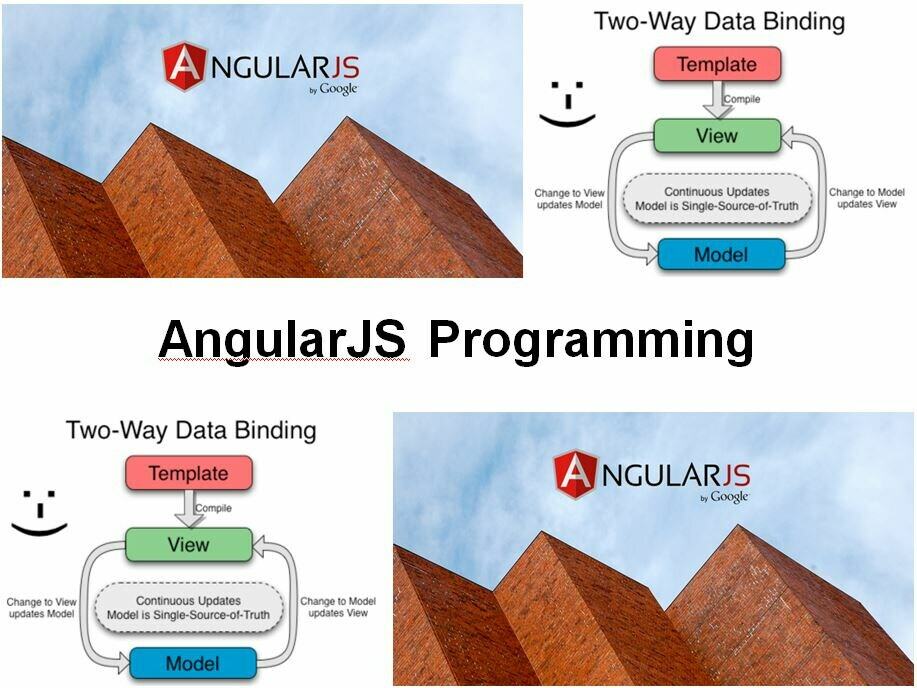-
Learning by doing
-
Trainers with practical experience
-
Classroom training
-
Detailed course material
-
Clear content description
-
Tailormade content possible
-
Training that proceeds
-
Small groups
In the course AngularJS Programming you will learn to program with AngularJS and how to use this JavaScript Framework in the development of modern Single Page Applications. AngularJS is the predecessor to Angular 2 and further and new applications will typically be created with the successor to AngularJS. However many existing applications are still written with AngularJS and these applications require maintenance.
The introduction examines the architecture of Single Page Applications and in particular the Model View Controller pattern. Also the essential features of AngularJS applications are discussed such as dependency injection and two way data binding. Declarative binding between data and user interface elements and the role of the scope object and controllers is also covered.
Subsequently expressions in AngularJS are discussed with the mustache syntax with which variables and properties can be displayed. Also a number of important directives of AngularJS such as ngModel, ngController and ngBind are treated. With these directives HTML is as it were expanded.
Subsequently attention is paid to filters and validation and a wide variety of AngularJS functions are also on the course schedule. Both built-in filters and user defined filters are covered.
Then it's the turn of Routing in AngularJS applications. Through routing part of a web page will be replaced or loaded with new data on the basis of a URL pattern, possibly with parameters provided. The built-in Angular router is discussed as well as external router libraries. And also treated are services in AngularJS that can typically be injected as a singleton anywhere in the application.
Finally templates are covered with which, among other things, reuse is realized and attention is paid to how the AngularJS module system works. Larger AngularJS applications are made up of modules that exchange data with each other. We also look ahead to various characteristics of the successor to AngularJS with respect to potential migrations.
This course is for Web Designers and Web Developers who want to learn how to create Single Page applications with Angular JS.
To participate in this course knowledge and experience with HTML, CSS and JavaScript required .
The theory is discussed on the basis of presentation slides and is interchanged with practical exercises. Demos are used to clarify the theory. Most commonly used browsers are available for running the code. Course times are from 9:30 to 16:30.
Participants receive an official certificate AngularJS Programming after successful completion of the course.

Module 1 : Intro Angular JS |
Module 2 : Expressions and Directives |
Module 3 : Filters and Validation |
| What is AngularJS? Single Page Applications AngularJS Key Features Hello AngularJS Extending HTML MVC Pattern HTML Templates Two way Data Binding Directives Dependency Injection AngularJS Popularity Tools AngularJS Resources |
Expressions JSON Data Structures JSON Arrays and Objects Built-in Directives ng-Controller Directive ng-Controller Declarations Lexical Closure ng-Bind Directive ng-BindHTML directive ngRepeat Directive ngModel Directive ngClick Directive Custom Directives |
What are Filters? Filter in Templates Currency Filter Upper and Lower Case Filter orderBy Filter Multiple Filters Date Filter JSON Filter LimitTo Filter Custom Filters Filter Anatomy Using Filters in Controllers Using $filter in Controller |
Module 4 : Forms and Validation |
Module 5 : Routing |
Module 6 : Services |
| AngularJS Forms Text Inputs Checkboxes and Radiobuttons Select Options Tracking Changes by CSS Validation Validation Styling Nested Forms Form Submission Ajax Form Submission Form Reset Touched versus Dirty |
Routing AngularJS Routes Routing Configuration ng-View UI-Router Application Start Difference with ngRoute States and Services Activating States UI-Router Directives $stateProvider $stateParams |
What are Services? Need for Services Built-In Services $log Service $filter Service Creating Services with Factory Injecting Services Creating Services with Service Service with Provider $http Service Using built-in Service Dependencies |
Module 7 : Templates |
Module 8 : Modules |
Module 9 : Miscellaneous Topics |
| Angular Templates Static Templates ng-include $templateCache Service Static Template in File Dynamic Static Template Nested ng-include Recursive Templates Recursive JSON Structure Custom Directives templateUrl Property Variable Binding in Directive Isolating $scope from Directive |
Understanding Controllers Injected Controller in Module Avoid Global Namespace Controller in Module Controller in Separate File Scopes $watch Scope Inheritance Scope Inheritance Scope Event Propagation Scope Life Cycle $watch, $apply(), $digest() Multiple Modules |
REST Services $resource Service Create a Resource Resource Factory Resource Constructor Resource Instance Animation in JavaScript jQuery Animations CSS Enabled Animations Animating in AngularJS Animating ngRepeat ngShow and ngHide Animating ng-view |
